- Home
- Matthew Pearl
The Professor's Assassin Page 2
The Professor's Assassin Read online
Page 2
The other students retreated a few steps, distancing themselves from the uglier turn in the scene. Rogers abruptly realized he was facing someone whose whim could turn tragic. His survival was more important than whatever shred of his authority remained.
He slowly lifted his foot from the downed boy, who scrambled away on all fours before regaining his feet and disappearing into the darkness. Rogers, maintaining a deliberate pace, began to walk away from the Harrison pavilion. As he did, he heard footsteps behind him and then, sending a chill through his blood, the cocking of the pistol.
“Would you shoot a man in the back?” asked Rogers without slowing down or turning his head. “Is the man who follows me a gentleman?”
“How dare you question a University Volunteer!” snarled the student.
“If you want to discuss your demands as gentlemen, then your leaders are invited to sit down with Professor Davis,” Rogers said, still not turning around.
“To hell with Professor Davis! Goddamn Professor Davis, and goddamn you!”
Rogers kept walking, faster and faster across the way, and the footsteps followed through the grass, keeping up with his. He heard no one else—even this lunatic’s wild compatriots wanted nothing to do with this.
“You shan’t keep your back to a University Volunteer again! Do you understand?” demanded the pursuer.
Rogers just kept going for his pavilion. His heart was pounding in his ears so loudly that he couldn’t tell if the footsteps were rushing headlong toward him or had disappeared altogether. He could be shot at any moment, alone on the lawn. Never having married or had children, so much of his professional work left undone. He fumbled at his door, then pushed inside. Bolting it with his sweaty hands took almost twice as long as usual, and then … nothing. There were no sounds from outside. No shouts or gunfire. About a half-hour later, he heard glass being smashed in the distance—empty bottles, he presumed. The rioters had exhausted their drink supply, and retreated for the night.
Chapter 3
The science professor brooded for hours that night, unable to shake off the dread that had seized him with a pistol aimed squarely at his heart. He wished he had seen the fellow leave with his own eyes, because now the villain seemed a phantom in every shadow and around every corner. He had a stiff drink and then another, even as he thought about the need for a teetotaling college with a severe disciplinary program. He thought about his father, Patrick, who had come to America from Ireland to pursue his dream of teaching science to the public, a category in which he controversially wished to include women. When his father was at the College of William and Mary, he, too, had to curtail insubordinate and violent students from time to time. He thought about his brothers, each pursuing different paths in science, and wished more strongly than ever that they were all in the same place. He was only half himself when he was cut off from them. A train of fragmented thoughts and memories cascaded through his mind until exhaustion overwhelmed him and he at last fell asleep.
In his dream, the masked man was behind him again. This time the pace was harried. He ran and ran, and the pursuer followed at his heels. The terrain of the chase changed several times—the university lawn became the lecture room and then an isolated mountainside. Then there was a gunshot and blood was spilling from his body.
Rogers was awakened from the nightmare by shouting. At first, in the hazy rush of sudden consciousness, he thought that the assailant really had returned for him or had been there all along. Then he realized the noise was coming from outside on the lawn.
He had fallen asleep fully clothed, and so after splashing water on his face he stepped outside. The cries were coming from two pavilions down from his at the end of the range of buildings. As he approached, he recognized the young slave, who was about thirteen and one of a family owned by the Davises.
“What’s the matter—Jack, isn’t it?” Rogers asked.
The boy nodded, then said, “Over here, sir!” Running ahead, he led the professor around the corner from the Davis pavilion.
A figure was crumbled on the ground at the edge of the dim halo from an oil lamp hanging on the Davis’s portico. A low groan emanated from it. It was John Davis, prone on his face in the grass.
Rogers felt light-headed as he sank to his knees next to their faculty chairman. “Can you get up, John?” he asked, gently sliding Davis over on his back.
“Rogers,” he groaned, then coughed. “Help me, Rogers. I’ve been shot.”
“Send for Professor Cabell from Pavilion Two and Professor Howard from Three,” Rogers directed Jack. “Where is Mrs. Davis?”
“Inside,” said Jack, struggling for words. “Sleeping.”
“Make certain that your mother is with Mrs. Davis before we bring in the professor. The shock could do her great harm. Go, Jack!”
Jack ran off, animated by his mission. A few students approached, drawn by the commotion, and began to gather in consternation around the injured man. They were startled even more when Rogers rounded on them, growling, “Don’t move any closer!”
“We wish to help, Professor Rogers!” a tall, slender student with a long but neat mustache protested. He was still in sleep clothes.
“If any of you have been among the rioters, I do not want you near this man,” Rogers snapped. “If you’ve rioted, you best turn and walk away now!”
The students, now joined by a few newcomers, exchanged glances, but none moved.
“We despise the riots, sir,” the slender student spoke again. “Let us give you a hand. Please.”
Rogers asked, “You’re Dabney, aren’t you?”
“Sir,” the student replied. “Robert Dabney. I sat in a course of yours last year.”
Rogers nodded and allowed Dabney and another student to help lift John gently from where he lay. They slowly carried the fallen professor toward his residence, taking great care with each step not to jolt the victim.
“Do you know who did this to you, Professor Davis?” Dabney asked. “Did you see the scoundrel’s face who shot you?”
Davis groaned in pain.
“For heaven’s sake, not now, Dabney!” Rogers reprimanded the young man.
“Do you know who did this, Professor Davis?” Dabney persisted.
“Yes,” Davis said weakly. “I do, my boy.” But he said no more.
They reached the entrance to the Davis pavilion as Jack arrived with Cabell, the university’s young professor of surgery, who took the place of one of the students carrying Davis and led the procession to a sofa on the second floor. Jack’s mother, Sally Cottrell, was hovering next to Mary Jane Davis and tried to help her onto a chair, but the injured man’s wife collapsed on the rug, wailing.
“Give me space! Give me space!” the doctor ordered over her cries. “Tell my two Negroes to come here with my instrument case. Clemens,” he said to a student he recognized, “you stay and assist us until Professor Howard arrives.”
Rogers herded the rest of the group back downstairs, looking over his shoulder for only a moment as Davis’s vest was being stripped away. There was a dark cavity in the abdomen, and he tried not to show the younger men his alarm at the bloody sight. He then took Dabney aside.
“How did you know what happened?” Rogers asked.
“I was sleeping and heard the shouts from my room.”
“I remember you from my course as a polite and respectful gentleman.”
“Thank you, sir. I am glad for it.”
“Then why did you accost Professor Davis with questions when you saw as plainly as I did his dire condition?” Rogers demanded.
“We need to discover without delay what Professor Davis knows!”
“What do you mean?”
“How else will the villain be apprehended before he takes flight? Would you not flee if you shot a professor in cold blood?” Dabney posed.
Rogers hid his irritation that the student could have realized that disquieting possibility before he had. “I would never shoot a man, so I daresay I
cannot imagine it one way or the other. Mr. Dabney, pray make certain your friends stay out of the doctor’s way. That applies to anyone else who comes to the pavilion to inquire about what happened.”
Next, Rogers went into the dining room and found Jack in a corner, hiding his face. When the professor called him, he wiped his eyes quickly with his sleeve and stood at attention. He was not frightened, it seemed to Rogers, but embarrassed at showing his grief.
“Will he live, sir?” he asked.
Rogers paused as the sounds of acute distress from the injured man and his wife reached separate peaks. He thought of Davis smiling in their meeting at the Rotunda that evening, and tried the same with the boy, though it felt ineffectual. “Jack, can you tell me exactly what you saw tonight?”
Jack nodded. “We were all inside the house after the professor returned from his meeting. After a while, it got quiet outside. Everyone went to sleep, except for the professor. He stayed at his desk. Then there were fresh sounds of pistols firing, so the professor took his hat and exited, and I ran after him outside. It was between nine and ten o’clock, I think. Even though I wanted to help, he told me to stay inside, that he was going to see after the noises and make certain nobody was in danger. I should have never left his side!”
“What happened next?”
The boy’s hands fidgeted with his sleeves, and he bit the bottom of his lip. Wanting to put him at ease, Rogers pulled up two chairs and they sat across from each other.
Jack took a few more moments before speaking again. In a guilty whisper, he said, “I didn’t go back inside like he told me to. I didn’t want to leave him outside alone with all that’s been happening!”
Rogers nodded reassuringly. “I understand perfectly, Jack. What did you do?”
“I stayed right there by the portico against his wishes. It must have been twenty minutes that passed, then I saw a flash and heard another pistol firing, then a thump. Someone ran by me wearing a mask, and another one. I ran to where I heard the noise and found the professor in the grass where you saw him!” Jack’s expression hardened, from grief to determination. “I want to help you, sir.”
Rogers looked at him quizzically. “Help me?”
“I want to help you find the man who shot my master!”
“I thank you, Jack. But it is the civil authorities, not any one of us, who must find the guilty party.”
Jack raised a questioning eyebrow at this but then nodded.
The groans from the injured man became less frequent and soon quieted altogether, lending an ominous atmosphere to the house. Gradually, the other faculty members had arrived, while a mass of students congregated on the lawn outside. Another forty minutes passed before Professor Cabell, who had been joined by their colleague, Professor Howard, and a doctor from town, emerged from upstairs. His hands and clothes were soaked in blood. Rogers tried to read his face, but it seemed to betray only his exhaustion.
Everyone present gathered around with bated breath—Mary Jane Davis and their children; Rogers; Jack and his mother, Sally; the professors and their wives; Robert Dabney and a few other students who were helping inside the pavilion.
“We could see where the ball had gone into his abdomen,” the professor of surgery explained, “but could not locate it. After an hour, we were able to feel it below the hip joint, a fair distance from the wound at the surface. We believe it did not touch any mortal part.”
“And John?” Rogers managed to find the strength to ask.
“He is in no immediate danger,” said Cabell. “He will live!”
The entire group applauded, gave the team of doctors three cheers, and embraced one another.
“What about the bullet?” Dabney asked eagerly. “Will you be able to take it out?”
“We have determined it is in a place that can cause no further damage. To remove it would be a risk.”
Rogers stopped Cabell before he passed back out of the room.
“Professor, are you certain about the bullet?” asked Rogers. “Is there not a greater risk to leaving a foreign body in such a delicate place?”
“No,” Cabell answered sharply, glancing sidelong at his fellow faculty member. “Nature has its powers of absorption in such cases, Professor Rogers.”
“But the danger for infection—”
Cabell interrupted, “There may be those students who fall under the spell of your orations on science, Professor Rogers, but have no doubt that I do not place your subjects in the same field as the great areas of knowledge. I only pray the gaudy spectacles of your lectures do not tempt even one scientific mind from the useful path of medicine. Now, if you’ll excuse me, I have a patient to attend to—and prayers of gratitude to render for his miraculous survival.”
Chapter 4
An emergency meeting of the faculty at the Rotunda the next day brought two surprises. The first was the naming of Gessner Harrison as the chairman pro tempore of the faculty; second, the county sheriff was present. It was not entirely clear to William Rogers how Harrison found himself chairman and whether there had been a vote Rogers had missed, but too much else on his mind prevented him from wondering about it for long. The riots had ceased once the news of Davis’s shooting had spread, but there was none of the relief that would have accompanied the change only a day before. The air in the library—and all across the university—was heavy with disbelief and something else to which Rogers could not put a name. Affliction, perhaps. As though the entire population of the college had been physically sickened overnight.
Chairman Harrison seemed entirely comfortable resuming his old position among the faculty. His every word carried a tone of pomp and gravity. “Gentlemen, we come together at a time when the very future of our university is in question. Our chairman shot down by a masked student of our own university. You may ask yourself, ‘What young man shall wish to matriculate here, what man of letters shall be enticed to an appointment here, with this blight upon us?’ ”
“Tell us, Harrison, are we in danger?” demanded Howard, trying to steady his trembling right hand with his left. “Why, is it madness to remain here?”
“Surely you do not think there will be more harm to come?” Tucker asked.
“Why not?” Howard asked. “Davis has been shot. Is one of us next? Harrison, what say you?”
Harrison quickly introduced the sheriff, Francis Helms, a plump man who grew short of breath merely from the mild exertion of shaking the hands of the faculty members. “Sheriff Helms is prepared to offer his full opinion of the case.”
“Thank you, Mr. Chairman. Gentlemen,” the official announced, “I understand your fears. But I am afraid a university is one of the most difficult sorts of places to make an arrest in a peculiar situation like this one. Even right-hearted students are loath to testify against their brethren.”
“Professor Davis hasn’t been able to tell you anything of use, then, Sheriff Helms?” Harrison asked.
The sheriff had a habit of bobbing his head up and down when he was responding to a question in the negative, as he did now. “I’m afraid not. The assailant wore a mask just like all the others involved in your recent riots. Your Professor Davis knows nothing of his identity.”
Rogers shot up straight in his chair. “Impossible. I heard Davis tell Robert Dabney he knew who did it even as we carried him inside from the lawn!”
The sheriff seemed surprised by this, but after a contemplative rubbing of his beard gave a dismissive shrug.
Professor Cabell spoke up, apparently all too pleased to reinforce the point against Rogers. “Perhaps Davis was out of his head at the time he said that, Professor Rogers. After all, he had just been shot in the stomach.”
“There must be more you can do!” Rogers said, ignoring Cabell and directing himself to the officer of the law. “I was followed from Professor Harrison’s pavilion last night by a student speaking threateningly and brandishing his pistol at me. I would not be the least surprised if it was the same person responsible for this
heinous act.”
“Do you know who it was who followed you?” asked the sheriff.
“No,” Rogers answered.
“Indeed! We will continue to question the students and the Negroes who were in the area,” said the sheriff. “But I must insist on being honest, as that is my philosophy ever since I was a boy. I am rather a pessimist about discovering anything. I require evidence before I can take action. Here, you have a man shot by a student in a mask, and you have a university half filled with masked students armed to the teeth.”
“Shame! The culprit deserves to hang higher than Haman for this!” Harrison said.
“In a few days I must leave for Scottsville, gentlemen,” the sheriff said. “You can trust I shall do everything in my power in the meantime.”
Rogers barely heard anything that passed in the rest of the meeting. He could not stop thinking about Davis’s words as they carried him inside his pavilion. Yes, he had answered Dabney’s question about whether he knew who had committed the crime, I do, my boy. No, he had not seemed out of his head at all at the time. Perhaps Dabney had been right. They should have asked more questions when they had the chance. Repeating the exchange over and over in his mind’s eye, Rogers was taken out of his thoughts only when the meeting was adjourned. When he rose from his chair, Cabell hailed him.
“Professor Rogers, a word, please.”
“Yes?”
“He wishes to see you. Professor Davis, I mean.”
“Me?” Rogers asked.
Cabell evinced a grudging measure of surprise, too. Even more than most of the faculty, the medical professor was skeptical of the idea of a professor of practical sciences, even as a minor department of the university, and further objected to Rogers’s dual employment surveying the distinct geographical terrain of Virginia for the Commonwealth. Professors never liked to think their brethren were doing anything exciting. “The man is in no condition for social calls, Professor Rogers. He must rest. But it is his request that you call at one o’clock.”

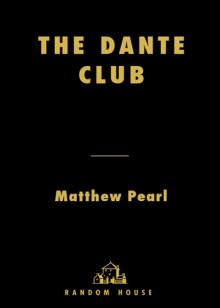 The Dante Club
The Dante Club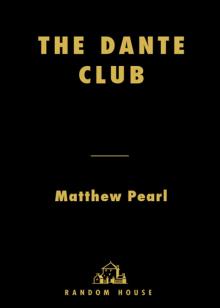 Dante Club
Dante Club The Poe Shadow
The Poe Shadow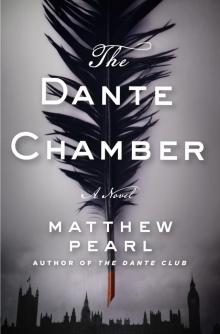 The Dante Chamber
The Dante Chamber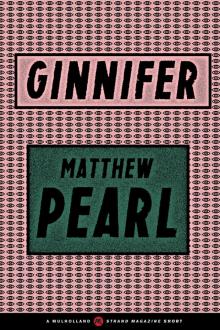 Ginnifer
Ginnifer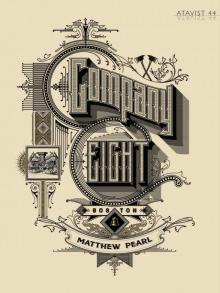 Company Eight
Company Eight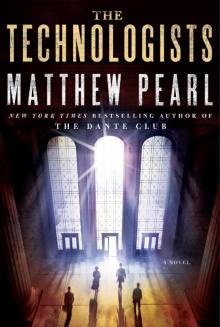 The Technologists
The Technologists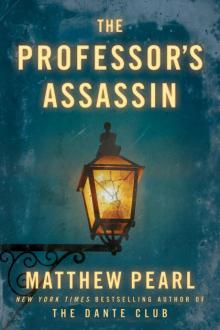 The Professor's Assassin
The Professor's Assassin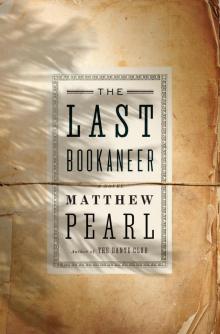 The Last Bookaneer
The Last Bookaneer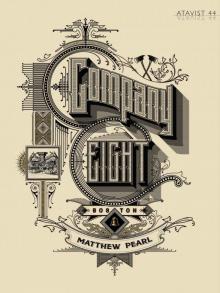 Company Eight (Kindle Single)
Company Eight (Kindle Single)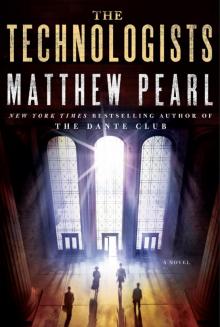 The Technologists: A Novel
The Technologists: A Novel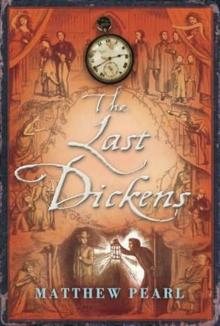 The Last Dickens
The Last Dickens